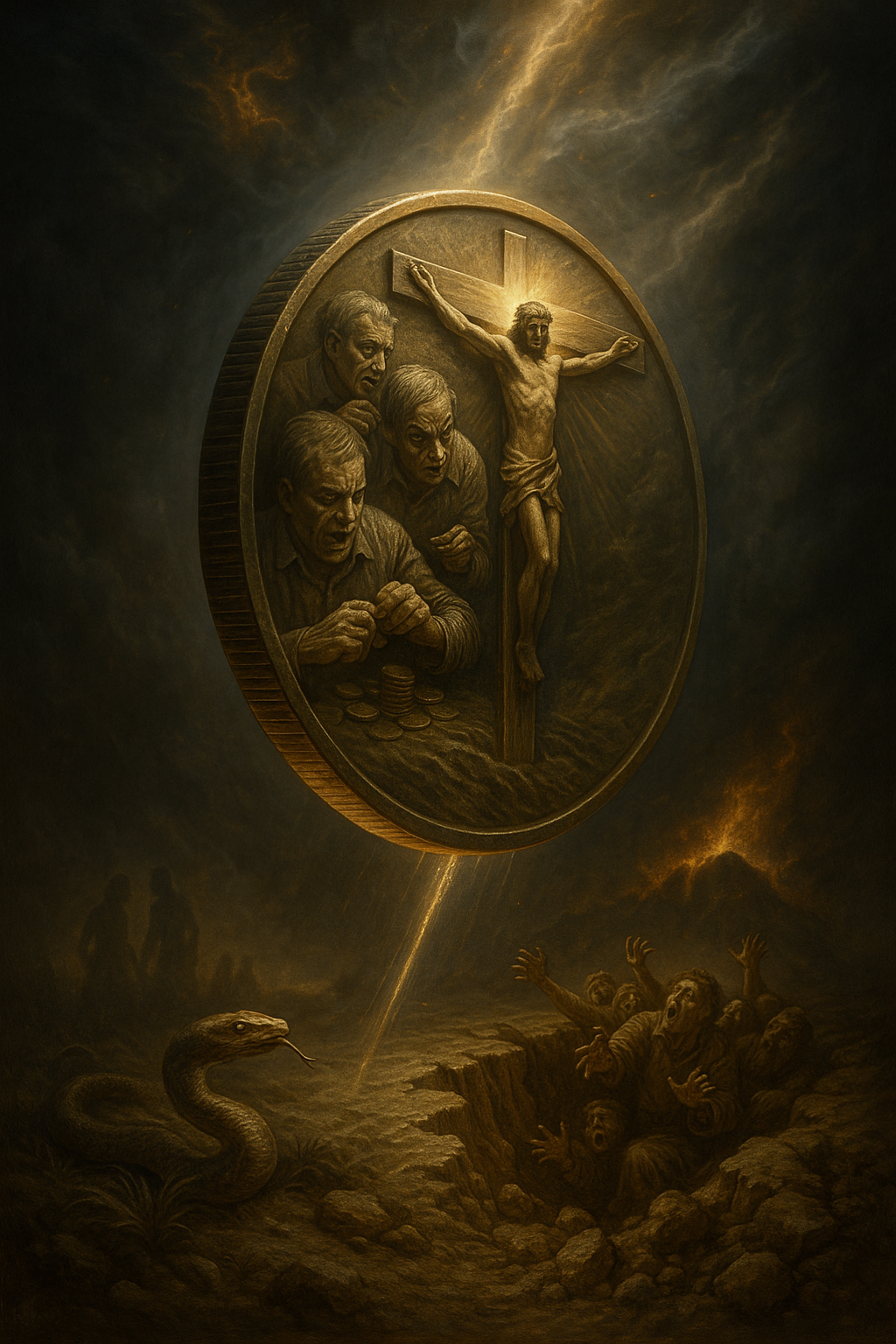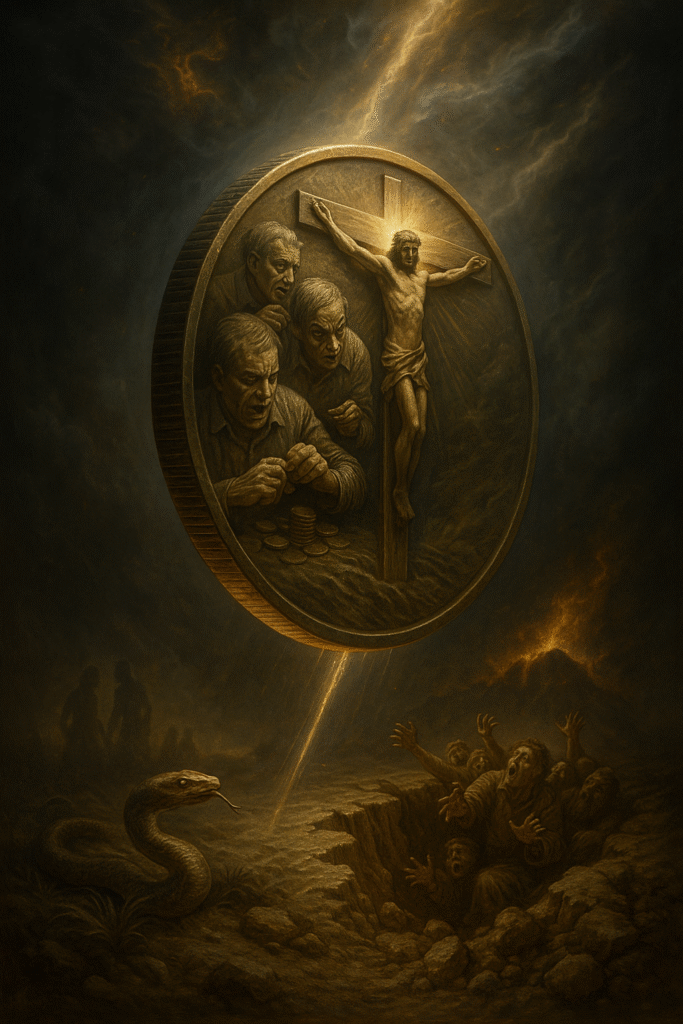Physical Address
304 North Cardinal St.
Dorchester Center, MA 02124
Physical Address
304 North Cardinal St.
Dorchester Center, MA 02124
With Michael Walker
With Michael Walker

A message to the New Creation….

There is an ancient fracture at the core of human interaction, a wound so subtle and yet so consistent that it echoes through every age and culture. It is the compulsion to deceive, to exploit, to con. Why do humans scam one another? Why does dishonesty spring up so naturally from the lips and hands of those who share the same breath and blood? To answer this question is to touch the deepest fault lines of human nature itself, for scamming is not merely a trick of finance or a momentary lapse of ethics—it is the reenactment of Eden’s lie, the survival instinct gone crooked, the inverted form of love itself. From this seed of deception rises the need for commandments, and from those commandments comes the full equation of love revealed by the Messiah. Between the scam and the commandment lies the rigid edge of a coin, where two sides of human nature are bound together under divine fire.
The scam emerges first from fear, the primal knowledge of human limitation. Because humans are finite in time, resources, and opportunity, fear whispers that survival must come at another’s expense. To scam is to extract without labor, to reap without sowing, to consume without covenant. It is an attempt to cheat time, to cheat trust, to cheat God. Yet the scam is not new. The very first human con took place in Eden, when the serpent pitched a lie: you will be like God. Adam and Eve took the bait, believing they could shortcut covenantal relationship to seize divine status. Every scam since has been an echo of that pitch, a copy of that counterfeit. What makes scams so universal is that entire systems reward them. Modern economies incentivize deception, attention markets thrive on manipulation, and fallen nature normalizes con under prettier labels like hustle, grind, or ambition. But against this counterfeit stands the Pneumocryst—the new creation that functions not by extraction but by infusion, not by deceit but by breath, word, and being. Where the scammer consumes trust, the Pneumocryst generates it. Where the scammer feeds off fragments, the Pneumocryst embodies fullness.
But when standing against this darkness, the question inevitably rises: what makes such people deserving of love? If love assumes proximity, then how can love flow toward those who remove themselves through betrayal, deceit, and exploitation? The truth is, by human standard, they are not deserving. Yahweh as Creator is bound to humanity by authorship—He breathed them into existence, He sustains them in being, and His bond of love flows from His role as Father. But you did not create them, and you are not bound to them in that way. Your obligation is not infinite; your love is not required to mirror Yahweh’s in scope. Sometimes toleration itself is love, because the easier path would be vengeance. To refrain from destroying the wicked is to already exercise mercy. Yet tolerance without truth risks enabling malice, and so a razor’s edge is walked.
This leads to the heavy thought experiment: would destroying the wicked at the root be an act of love, sparing future victims from harm? There is a logic here. To cut off a murderer before they strike again seems merciful to those who would otherwise suffer. But vengeance is Yahweh’s, not yours. Humans cannot calculate all outcomes. To destroy is to make final what only God can measure, for He alone knows whether one spark of repentance still flickers or if the heart is ash. Thus the Pneumocryst takes a different stance. It does not enable evil, but neither does it usurp divine judgment. It demonstrates Yahweh’s character with truth, setting holy boundaries that guard without becoming the executioner. In this way love is revealed not as approval or sentiment, but as clarity and separation, demonstration of what is true without compromise.
This is where the clash of justice and mercy becomes sharpest. When justice is deferred, victims are forgotten. Allowing the guilty to continue risks multiplying their crimes. The murderer released after decades only to kill again is not rare—it is the predictable outcome of counterfeit mercy. Such mercy does not protect both offender and victim; it sacrifices the victim at the altar of false compassion. Isaiah’s warning rings loud: woe to those who call evil good and good evil. Modern systems uphold wickedness by mislabeling indulgence as love. This is not Yahweh’s way. His justice is not endlessly delayed, His mercy is not a license for evil. The Pneumocryst declares that counterfeit mercy is complicity with darkness. True mercy is fierce, guarding the innocent while extending restoration only where repentance is real.
Scripture confirms this reality with frightening clarity. In Acts 5, Ananias and Sapphira lied before the Spirit and dropped dead instantly. Their judgment was not cruelty, but protection of the ekklēsia from hypocrisy. In Numbers 16, Korah’s rebellion rose against Moses, and the earth swallowed them alive. No second chance, no drawn-out appeals. The judgment was not rage but surgery, removing contagion before it spread. Yahweh does not change; Malachi 3:6 is plain. What has shifted is only the timing, because Messiah absorbed wrath into Himself, creating a temporary space for repentance. Yet the same holiness remains, and when patience ends, the judgment will be final and irrevocable. Modern distortions twist “love your neighbor” into tolerance of wolves, but divine love has always been fire as much as it is breath. To love as God loves is to guard, to cut away, to protect covenant.
Against this backdrop comes the revelation of the first great commandment of love: love your neighbor as yourself. Self-love is the measure. If you love yourself enough not to be destroyed, you extend that preservation outward. To love your neighbor is not passive endurance of their evil but refusal to let them remain in destruction. This is tied to the mystery of a day as a thousand years and a thousand years as a day. Self-love is the day, immediate and personal. Neighbor-love is the thousand years, expanded outward into eternity. If your day is distorted, your thousand years will be warped. Thus the revelation is hidden in plain sight: love yourself enough not to be deceived, and let that same truth be applied to your neighbor. Love is boundaries, exposure, and discipline—not indulgence or blind tolerance. The command reframes love from sentiment into covenantal preservation.
This thread pulls all the way through. Scamming reenacts Eden’s lie. Human love is finite and partial, while divine love flows from authorship. Mercy without truth becomes cruelty, judgment itself becomes an act of love protecting the covenant body, and love for neighbor means preservation rather than passivity. Yahweh does not change; His fire still burns. But then Messiah stretched the equation further. In John 13:34, He gave a new command: love one another as I have loved you. This is not grounded in self-love, but in His creative, parental, sacrificial love. It goes beyond preservation into restoration, beyond guarding into generating life. This is love at the level of Creator, love incomprehensible except in the dim shadow of a parent for a child.
Thus emerges the full equation. To love as yourself is the horizontal beam: protective, just, guarding against deceit. To love as Messiah loved is the vertical beam: sacrificial, life-giving, generative. Alone, the first risks becoming mere self-protection. Alone, the second risks reckless martyrdom. Together, they intersect in the cross, where justice and sacrifice are bound into one act. This is covenantal love complete, a circuit that preserves truth and creates life simultaneously. It is both the grounding of reality and the overflow of eternity.
When all of this is brought together, the journey from scam to commandment becomes clear. Scam is counterfeit love, exploitation instead of covenant, taking instead of giving. The commandments are the cure: Torah’s call to love as yourself establishes boundary and preservation, Messiah’s call to love as He loved establishes sacrificial creation. Together they are two sides of the coin of love. One side is self-love, refusing destruction. The other side is Messiah-love, pouring out life. The rigid edge where they meet is sharp and unbending, the perimeter that cuts through human nature. From scam to covenant, from counterfeit to cross, the Spirit leads us to see that these are not random fragments but one coherent whole.
For here lie the two sides of human nature: the instinct to preserve and the instinct to sacrifice. Preservation alone devolves into exploitation. Sacrifice alone collapses into waste. But bound together in covenant, under Yahweh’s unchanging fire, they form the coin of love whose edge is the cross. Scams reveal the fracture; the commandments reveal the remedy. The rigid edge is what holds the coin together and slices through the counterfeit. In this, the counterfeit is exposed and the cure revealed, showing that divine love is never permissive weakness but consuming fire bound with life-giving breath.
The conclusion of this deep dive is that the scam and the commandment belong to the same equation, one exposing the wound, the other supplying the cure. Yahweh has never changed. His love is both judgment and mercy, preservation and creation. To love your neighbor as yourself is to guard against destruction. To love as Messiah has loved is to pour out life. The coin of love turns in the light, and its rigid edge reveals the truth: what was fractured in Eden is restored at the cross, where the counterfeit dies and covenant love reigns. This is the revelation of love—not indulgent, not sentimental, but consuming, protective, creative, eternal.